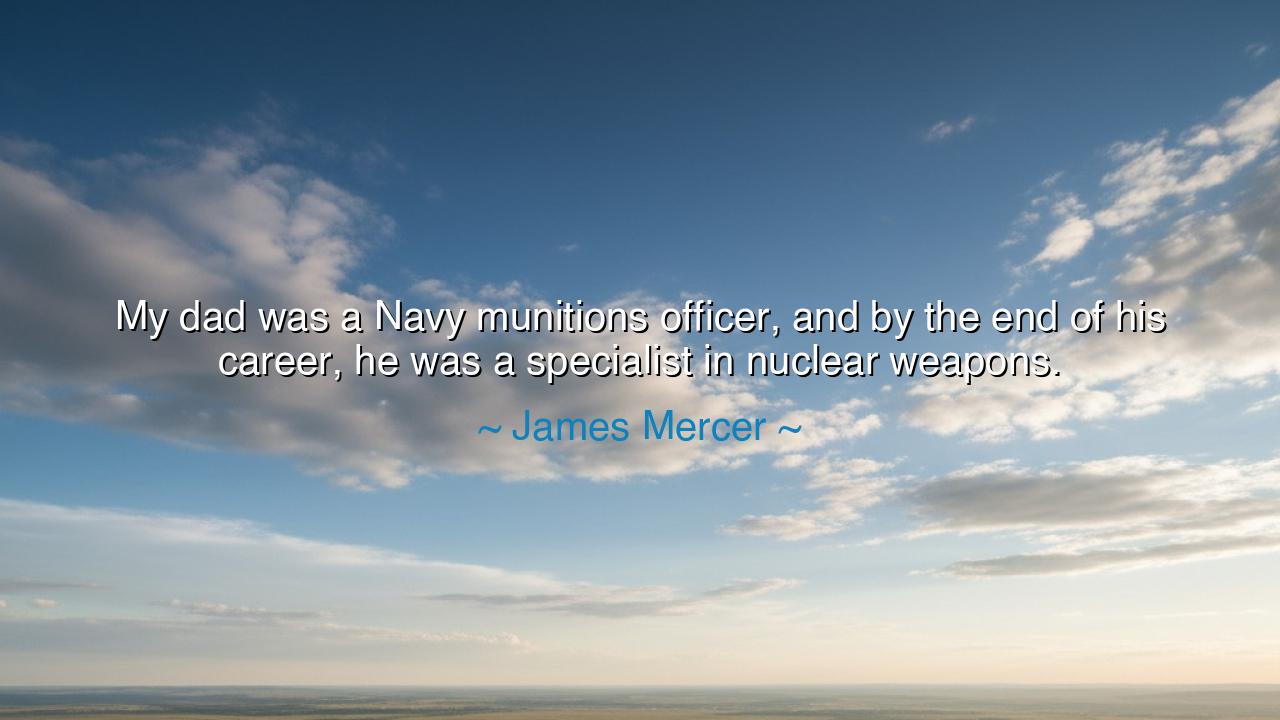
My dad was a Navy munitions officer, and by the end of his
My dad was a Navy munitions officer, and by the end of his career, he was a specialist in nuclear weapons.






In the words of James Mercer, we hear the echo of legacy, duty, and the burden of human progress: “My dad was a Navy munitions officer, and by the end of his career, he was a specialist in nuclear weapons.” Beneath this seemingly simple recollection lies a profound meditation on the paradox of strength — that those who serve to protect life must often stand close to the instruments of death. It is a story not only of one man’s father, but of an entire generation who bore the weight of power and restraint upon their shoulders, guarding a peace forged by fear.
The Navy munitions officer is a figure of immense responsibility — a guardian of fire. His work lies in shadows, where precision and discipline govern every heartbeat. To handle weapons is not to celebrate destruction, but to live in constant reverence of consequence. And to become a specialist in nuclear arms, as Mercer’s father did, is to touch the edge of creation itself — to hold in one’s knowledge the power that could unmake the world. Such a calling demands not pride, but humility; not passion, but control. It is the paradox of the protector: the one who must stand nearest to chaos to ensure that others may live in peace.
This truth has been known since ancient times. In the days of Rome, the general Marcus Furius Camillus was called the “Second Founder of the City,” for he saved Rome not through conquest alone, but through restraint. He knew that true power is not proven by use, but by the wisdom to withhold it. So too did the nuclear officers of the modern world — those who maintained the balance of nations through vigilance rather than violence. Theirs was the heavy peace of the twentieth century, a peace built upon the shoulders of those who quietly bore the fear that their craft could end all things.
When James Mercer speaks of his father, he is not merely recalling a profession; he is honoring a man who lived in that delicate tension — between the duty to serve and the knowledge of destruction. To grow up in the shadow of such responsibility shapes the soul in subtle ways. It teaches reverence for order, a respect for unseen sacrifices, and a deep understanding that the world’s safety often depends upon the calm of a few. From that lineage of silence and precision, Mercer himself — as a musician and poet — carries forward the same balance, not of weapons, but of words: crafting beauty that steadies the human heart rather than threatens it.
The story also reminds us of the burden of technology, that double-edged gift humanity has carried since Prometheus stole fire from the gods. Each generation inherits greater power, and with it, greater responsibility. The nuclear specialist is the modern Prometheus — bound not by chains, but by conscience. He holds within his knowledge both salvation and ruin, and he must live with the awareness that his work walks the razor’s edge between them. In such a life, humility is not weakness; it is wisdom born of understanding how fragile existence truly is.
Let this be the lesson for those who come after: power must always be tempered by conscience. Whether it be the power of invention, influence, or authority, it is not strength alone that defines the noble soul, but restraint — the choice to serve rather than to dominate, to protect rather than to destroy. The world endures not because of the might of its weapons, but because of the hearts of those who wield them with reverence and care.
Action for the living: Reflect on the powers you hold — in your work, your words, your hands. Use them not to assert control, but to serve the good. Remember that every skill, every talent, carries both creative and destructive potential. Like the munitions officer, handle your gifts with discipline, precision, and humility. For in the end, the greatest legacy one can leave is not the strength to conquer, but the wisdom to preserve — to hold back the storm, and let others live beneath a sky still whole.






AAdministratorAdministrator
Welcome, honored guests. Please leave a comment, we will respond soon